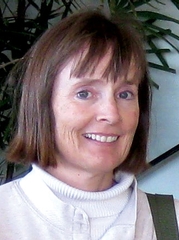Carolyn Reynolds
AMS has drawn on its exceptional diversity to facilitate academic–government–private sector partnerships, foster cross-disciplinary research, and promote recruitment, education, and integration of the next generation of scientists. As the complexities and interdependencies of the atmospheric, oceanic, and hydrologic sciences and applications increase at an astounding rate, AMS must nimbly adapt to these rapid changes for continued relevance and success. Looking inward and outward will allow AMS to meet this formidable challenge.
Looking inward, AMS should reflect on the effectiveness of the current organizational structure. Do the current boards and committees continue to map well onto the structures and needs of the rapidly expanding private sector, and adequately promote public–private sector cooperation? Do they appropriately reflect the increasing interdisciplinary nature of the scientific community? Do the Certified Consulting and Broadcast Meteorologist programs continue to meet the needs of this rapidly diversifying constituency? Commendable improvements such as open access after one year and early online release have substantially broadened the reach and impact of the AMS journals. Continued adaptability and forward thinking will be needed in this increasingly competitive arena.
Looking outward, AMS can learn from and coordinate with other national and international professional organizations to leverage their advances and strengths. How do we best coordinate with complementary organizations such as the American Geophysical Union, the Canadian Meteorological and Oceanographic Society, the European Geosciences Union, and the National Weather Association? How can we learn from the successful education, outreach, and mentoring efforts of other organizations to improve upon our own efforts in these fundamental activities? How can we more effectively partner with other groups to increase recruitment and diversity of our membership, so vital to the long-term well-being of the organization?
It is an honor to be considered for AMS Council. If elected, I will work diligently with my colleagues to help AMS be forward-looking, be responsive to the needs of its members and society, and foster diversity and inclusiveness across sectors, disciplines, and backgrounds.
Carolyn Reynolds
Carolyn Reynolds is the lead scientist of the Probabilistic Prediction Research Office in the Marine Meteorology Division of the Naval Research Laboratory (NRL) in Monterey, California. She received a B. A. in Earth and planetary sciences from Johns Hopkins University and a Ph.D. in meteorology from Penn State University. She joined NRL in 1993 as a research scientist in the global modeling section, which develops and transitions the U.S. Navy’s operational global forecasting systems, and became head of that section in 2005. In her current position she promotes the development and use of probabilistic prediction systems for the U.S. Navy. She is also currently leading the atmospheric component of the effort to develop the global coupled Navy Earth System Prediction Capability.
Reynolds has experience in both basic science and operational system development. During her time at NRL, she has led projects in basic and applied research on predictability and adaptive observations, ensemble design, and global coupled system development. Her experiences at NRL and as a visiting scientist at the National Meteorological Center (now the Environmental Prediction Center) and the European Centre for Medium-Range Weather Forecasting make her well-versed in Research to Operations and Operations to Research issues and complexities.
Reynolds has been an editor for Monthly Weather Review since 2013 and was previously associate editor for the Journal of the Atmospheric Sciences. She is currently chairing the AMS Annual Meeting Oversight Committee and the AMS Meetings Task Force. She was a member of the AMS Weather Analysis and Forecasting Committee, served on several AMS award and conference program committees, cochaired a WAF/NWP conference, and is cochairing the Peter Webster Symposium for the 2018 Annual Meeting. Reynolds is an AMS Fellow.
Reynolds has participated in international field programs including THORPEX Atlantic and Pacific Regional Campaigns, DEEPWAVE, and NAWDEX. She was on the THORPEX North American Science Steering Committee and US THORPEX Science Steering Committee, co-led the NOAA Hurricane Forecast Improvement Project Ensemble team, cochaired the NASA Weather Focus Area Workshop on Scientific Challenges and Opportunities, and is a member of the WMO Working Group on Numerical Experimentation.
Reynolds has 62 peer-reviewed publications in 18 different journals. She received the Beneficial Hodson Merit Scholarship from Johns Hopkins University; three NRL Alan Berman Outstanding Research Publication Awards; and the Navy Acquisition Excellence Technology Transfer Award for the Navy Global Environmental Model, and has made 23 invited or keynote presentations.
